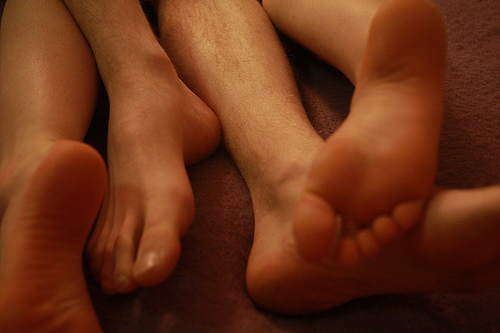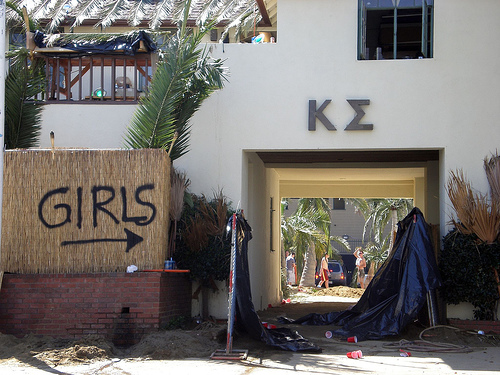Is Hooking Up Selling Out?

Women everywhere have heard it millions of times: “college is where you’ll meet your future husband.” This long-time held belief is what countless women expect; they enter college optimistic to find true affection for someone else.However, what happens is that colleges' hookup cultures quickly diminish women’s optimism for a relationship.
Hooking up is an ambiguous term. According to a freshman at USC, “[hooking up] can range from casually making out at a frat house to spending the night.” There is no commonly accepted definition. Thus, the sexual actions that constitute hooking up are vague. Whatever the sexual actions are, hooking up is the opposite of commitment. “It’s a no strings attached type of interaction,” claims that same freshman, “honestly there’s a strong chance that you might not even know the name of whomever you’re hooking up with.” This type of culture encourages sexual interaction without any type of emotional bonding.
These types of careless sexual interactions have created new social standards. Nationally, two thirds of college students have reported hooking up with someone else. Even more startling is that 90% of students say a hookup culture characterizes their campus. But why is this?
Hooking up is a culture created principally by college women to accompany their demanding, busy lives. According to Hanna Rosin, author of End of Men, “it is women—not men—who are perpetuating the [hookup] culture, especially in school.” Women are now more independent than ever before. On average, women outnumber men in college enrollment by a ratio of four to three and have higher graduation rates.
Elizabeth A. Armstrong, a sociologist at University of Michigan, studies young women’s sexuality. Her findings suggest that women are choosing hookups as opposed to relationships because they allow for women to focus on their academic and career goals, while still remaining sexually active. College is seen as a time for self-development; women use college as preparation for the rest of their working lives. This translates to resume building, through internships, school clubs, and participation in research projects. For college women, a relationship means a major distraction from this vital self-development.
Don’t get me wrong, I’m all for driven women, however, I have difficulties believing that women are the pioneers for the hookup culture. Arriving at college, my intentions were not to extensively partake in the hookup culture. I had just gotten out of a three yearlong relationship and was hopeful to find new love in someone else. Yet, this desire soon faded when I realized that I had to conform to the hookup culture.
My story seems typical of most women. They arrive at college hopeful for a relationship—to find genuine interest in someone—and when that seems unlikely, they give up and just adjust to the hookup scene—not because it will give them more time to focus on their futures but because it’s the only available option. Thus, this is the reason for the perpetuation of the hookup culture: slowly, women are training themselves to view sexual encounters as meaningless because that’s what is accepted. There is an expectation to hookup because that is the dominant social interaction. Because of this, people are giving into the pressure by changing their personal beliefs and practices to support the culture.

Proponents of casual sex argue that it can empower women by allowing them to be liberated from sexual constraints. Opponents will state the opposite- that hooking up in fact demeans women by placing them in a system of constant sexualization. If young women are not deriving emotional or spiritual benefits from the relationship, what's left? Drunk sex? Womp.
Enter Ashley Riegle. She is a second year Master's in Journalism student at USC Annenberg; Arts and Culture Editor at Neon Tommy; and an inadvertant expert on the millenial hookup and dating landscape.
Two years ago while living in NYC, she co-founded SingleForAReason.com, a website that receives and posts anonymous funny and/or terrible dating stories (those two things often go hand-in-hand) from readers around the world. The majority of submissions share awkward texts, bad pick-up attempts, stories of cheating, break-ups, STDs, etc. Riegle and her co-founder, a Vanderbilt alum, formed the site as a way for millenials to share stories in a light-hearted, but relatable way. As a result, she's heard a lot of stories.
Sex-without-benefits patterns are more evident in environments where males dominate or control the social scene, suggests Riegle. "I've seen it on heavily Greek campuses and I've seen it on Wall Street." "It's an old boys-club mentality that is sexist, archaic, pig-headed. And I feel bad for the young women who think it's legit".
The proliferation of free online porn, excessive drinking, and sexist media messages haven't helped our modern college dating scene. Our social realities are unique to the millenial generation- particularly the boom of online porn sites- which inherently color how millenials in the U.S. regard sex and relationships today.
"These elements send the message to guys that they don’t have to treat women right,” suggests Riegle. Texting and snapchatting arguably also play into it. "When is the last time a guy picked up the phone and actually called you like a gentleman? Equally so for millenial ladies out there- when is the last time you picked up the phone and called a guy out- out on his bullshit?" In many ways, social media has allowed our privileged generation to hide behind our smart phones and avoid actual engagement.
From Riegle's point of view, the millenial hookup mentality is based on terms established and controlled largely by men- and tolerated by women. Rarely do “old school, chivalrous things happen…and if they do, we don’t know what to do with them because as young women we've been taught to lower our standards".
Does this present reality mean young women aren’t entitled to cut loose? Absolutely not, argues Riegle.
"Women are allowed to have wasted nights…have fun, be liberated, and make mistakes.” What’s not okay, she says, is for women to accept and promote a culture where they're being perpetually sexualized and marginalized.
Women’s tolerance of disrespectful behavior by frat boy mentalities puts us more than a step behind. It puts us years behind. As difficult as it might seem—as peers conform to normalized social behaviors—stand up against the bullshit. As millenial women in the thick of this cultural moment, we must be the ones to stand up against misogynistic cultural trends.
For you, your little, little-little, and most importantly collective womanhood, change the present hookup landscape and introduce something worthy of being revered.
Reach Staff Reporter Christina Pecoulas here.



